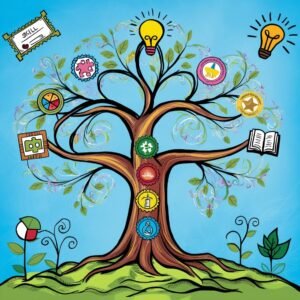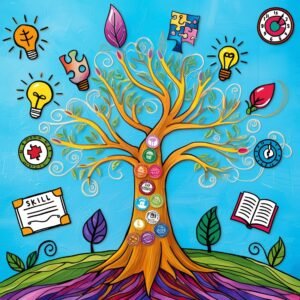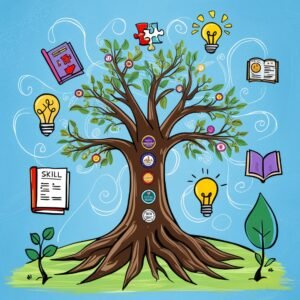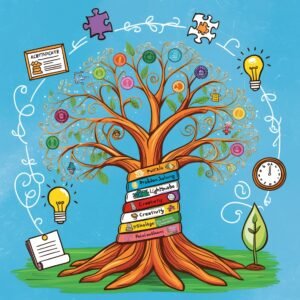“Skill Development and Life Skills”
Skill Development and Life Skills: The Real Tools for Success
Let’s be honest—school teaches you a lot of things, but not always the things you actually need to get through life. You may leave with a diploma, but still feel clueless about managing money, communicating well, or even handling stress. That’s where skill development and life skills come in—and they matter more now than ever.
In a fast-changing world, being “book smart” isn’t enough. Employers want people who can think on their feet, work well with others, adapt quickly, and communicate clearly. And life? Well, life demands all of that and more.
So, what exactly are life skills? Why is skill development important? And how can you start building these abilities today? Let’s break it down.
What Is Skill Development?
Skill development simply means learning or improving abilities that help you perform better—whether at work, at home, or in social situations. These skills fall into two big categories:
- Hard skills: These are technical and job-specific—like coding, graphic design, cooking, or accounting.
- Soft skills: These are people skills and personal habits—like communication, time management, adaptability, and problem-solving.
You can learn both types of skills through courses, real-life experience, or just trying things out. The key is to keep learning and growing, no matter where you start.
What Are Life Skills?
Life skills are the abilities that help you handle everyday challenges—big or small. These include:
- Decision-making and critical thinking
- Effective communication
- Emotional awareness and stress management
- Problem-solving and conflict resolution
They’re the skills that help you stay calm under pressure, speak up when it counts, and bounce back when things go sideways.
Why Skill Development and Life Skills Matter
Here’s the reality: the job market is evolving, competition is tough, and mental health challenges are real. You need more than textbook knowledge to navigate it all. Here’s why these skills are crucial:
1. Jobs Are Evolving
Thanks to technology, the kinds of jobs available today are changing fast—and so are the skills required. In fact, the World Economic Forum predicts that by 2025, over 50% of employees will need to reskill to stay relevant.
What employers value now:
- Problem-solving
- Critical thinking
- Creativity
- Emotional intelligence
- Communication
Basically, the more adaptable you are, the better your chances of staying ahead.
2. School Doesn’t Cover Everything
No one teaches you how to handle failure, set boundaries, or stay productive without burning out. Life skills like financial literacy, self-discipline, and emotional intelligence often get ignored in formal education—but they’re essential for adulthood.
3. Mental Health Depends on It
Being able to manage stress, regulate emotions, and set healthy routines can make or break your mental well-being. Life skills help you stay balanced, even when life gets messy.
7 Essential Life and Work Skills You Need
If you’re wondering where to start, focus on these key skills that help in both personal and professional life:
1. Communication
Good communication isn’t just about talking—it’s about listening, understanding tone, reading body language, and expressing yourself clearly.
✅ Why it matters: Better relationships, fewer misunderstandings, stronger teamwork.
💡 Try this: Practice active listening. Put away distractions when talking to someone. Use “I” statements to express feelings.
2. Problem-Solving
Life is unpredictable. Whether it’s a tech glitch at work or a fight with a friend, your ability to calmly find a solution matters.
✅ Why it matters: Builds confidence, reduces stress, and earns respect.
💡 Try this: When facing a problem, break it down. Ask: What’s the issue? What are my options? What’s the next step?
3. Time Management
Everyone gets the same 24 hours—but how you use them makes all the difference.
✅ Why it matters: Increases productivity, reduces stress, and creates work-life balance.
💡 Try this: Use a planner or digital calendar. Start your day with 3 key tasks. Learn to say no when needed.
4. Emotional Intelligence
This is about understanding your emotions, recognizing how they affect others, and managing them effectively.
✅ Why it matters: Improves relationships, supports leadership, and helps you stay calm under pressure.
💡 Try this: Pause before reacting. Journal your emotions. Ask for feedback on how you come across to others.
5. Adaptability
Life doesn’t always go as planned. Being flexible helps you respond to change without falling apart.
✅ Why it matters: Helps you thrive in new environments and handle uncertainty.
💡 Try this: Try new experiences regularly—different tasks at work, travel to new places, or switch up your routine.
6. Financial Literacy
Understanding money—how to earn, save, invest, and spend—is one of the most underrated skills out there.
✅ Why it matters: Helps you avoid debt, build security, and make smart financial choices.
💡 Try this: Use apps to track your spending. Learn about budgeting. Read up on credit scores and basic investing.
7. Teamwork and Collaboration
Whether at school, in a job, or in your personal life, you’ll need to work with others. Knowing how to collaborate makes everything smoother.
✅ Why it matters: Builds trust, increases productivity, and helps you handle group dynamics.
💡 Try this: In group settings, focus on listening before leading. Respect different opinions. Step up when needed, but also know when to support others.
How to Start Building Skills Today
You don’t need to wait for a course or a job. Here’s how to start developing your skills right now:
✔ Learn by Doing
Take on projects that push you out of your comfort zone—volunteer, join a team, start something small. Action builds confidence.
✔ Reflect Regularly
After a challenge or task, ask: What did I learn? What can I do better next time? Reflection turns experience into growth.
✔ Ask for Feedback
Sometimes we don’t see our blind spots. Ask people you trust how you can improve. Use it to get better—not bitter.
✔ Use Free Tools
There are tons of online resources to help with skill-building:
- Coursera, Skillshare, LinkedIn Learning – for professional and creative skills.
- Duolingo, Khan Academy – for language and academic learning.
- Notion, Todoist – for productivity and organization.
The Role of Parents, Schools, and Employers
Skill-building isn’t just an individual job. It starts at home, continues in school, and should be supported at work.
Parents can:
- Encourage independence.
- Normalize failure and learning from mistakes.
- Talk openly about emotions and problem-solving.
Schools should:
- Include real-world subjects like financial literacy and communication.
- Focus more on projects, teamwork, and emotional health.
- Create safe spaces for self-expression and skill practice.
Employers can:
- Offer mentorship and training programs.
- Recognize effort and growth, not just results.
- Create flexible, supportive work cultures.
Final Thoughts: Skills Are the New Superpower
In a world that’s always changing, skills—not just grades or titles—are what set you apart. Your ability to think critically, communicate well, manage your time, and stay emotionally grounded will carry you further than any certificate alone.
Start small. Pick one skill to work on this month. Track your growth. Celebrate progress, not perfection. Over time, these skills become second nature—and they’ll serve you for life.



